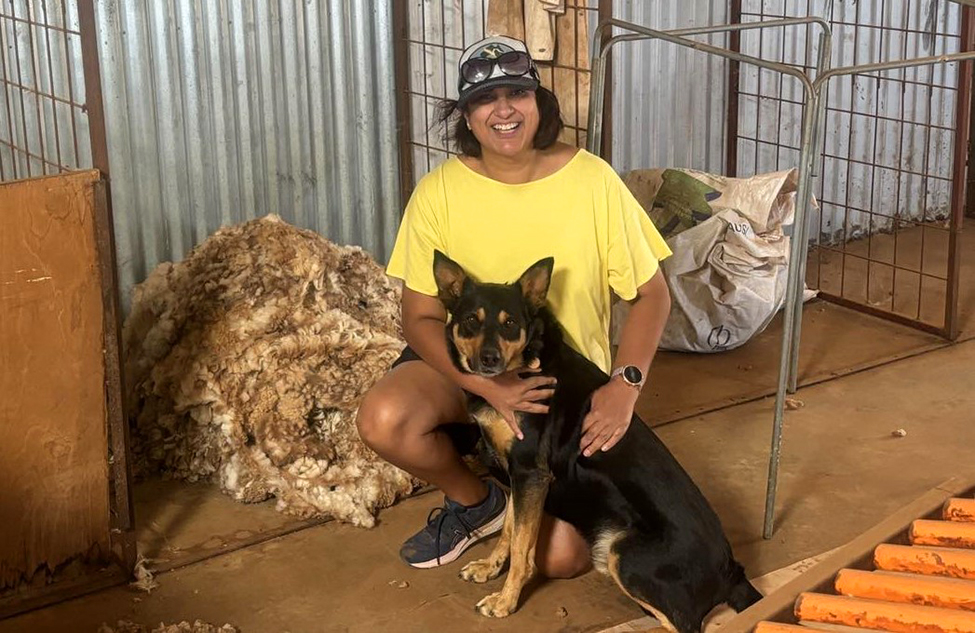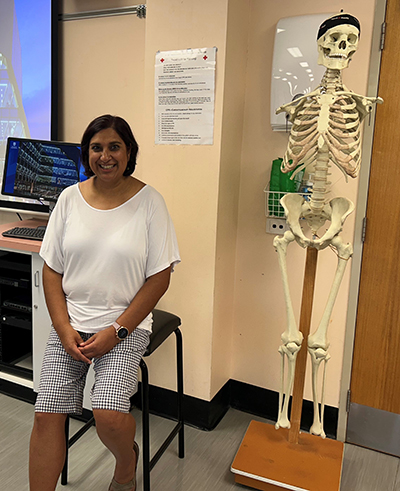- connecting our global business alumni network
05 February 2024
A new perspective on regional health
As a physiotherapist and farmer in South Australia’s mid-north Joyti Zwar’s connection to her rural community runs deep. Well aware of the challenges facing the health system in regional communities, she is working towards breaking down some of the barriers.

Joyti Zwar
UniSA Rural Health Academic: Physiotherapy and Farmer
Long aware of the challenges of attracting and retaining health practitioners to regional and remote areas, Joyti Zwar applies her unique perspective to her work with UniSA’s Department of Rural Health as a Physiotherapy Academic based in Port Pirie.
Joyti’s career in physiotherapy began in her native New Zealand before she was attracted to roles in the South Australian hospital, aged care and private sectors where she has held roles in clinical education, health service management, project and policy developement as well and clinical service delivery.
Joyti met her husband Wayne, a farmer, at a community cabaret event in the small town of Willowie when she was working as a physio, and her fate was sealed. Today, the couple run sheep and grow crops on their 700-hectare property at Caltowie West.
“After nearly 25 years of working remotely and being part of a small community, it gives you quite a different perspective from living in a large metropolitan setting with easy access to everything,” says Joyti.
“You may be the only health professional in a small town. There might be no hospital and just a visiting GP, so access is quite different to healthcare and health literacy in general.
“At the same time, you’re also a consumer – or your family are consumers – who may not be able to access the best standard of healthcare because of geographical location.
“While the NDIS and My Aged Care funding go some way to address this disparity, there’s still no better access for people in rural and remote areas.”
Joyti believes interprofessional learning is a means to improve this shortfall.
“It’s just a different way of providing services and is something for health professionals to think about. If you're a physio, you can also be looking at people's feet and skin and circulation and that then helps the podiatrists with their assessment because you have a similar skill set and sometimes our scope of practice can overlap.”
Joyti is involved in supervising students in a unique interprofessional clinic in the Whyalla and Rural Health clinic with students from different health professions working alongside and learning from each other, and this approach has been well received by students.
Consumers are also on the journey with them. “Certainly, the outcomes that we've seen have been positive in terms of them (clients) accessing regular therapy and being able to stay in their own homes.”

The interprofessional approach appears to be working. “Anecdotally, a lot of those students come back to rural practice in the first few years of their career.” Which goes towards addressing another issue. “The medical practitioners in remote areas aren't getting any younger, nor are the client base.”
Recruitment remains a significant challenge, and regional campuses go some way to address this by providing local study options for students for whom leaving their rural community is a barrier to study. Local graduates can now attain a degree and practice in their home community.
Joyti has also looked at the opportunities and barriers for regional private practitioners willing to host students as they complete their placement obligations. Not only is there a cost to the student, in terms of time and having to support themselves financially, but practitioners are also often sole traders and deterred by the time required to ensure they offer a great experience. After all, the end goal is to show students that regional practice offers choices and a lifestyle equal to any metropolitan area.
Dividing her time between the farm near Jamestown, an office in Port Pirie and the UniSA Whyalla Campus, with occasional visits to City East and the beaches of Yorke Peninsula, means many hours of country driving. But Joyti has embraced a regional lifestyle and is keen for others to share the experience.
Paying it forward
When friends and family members reached the stage when they had to consider the cost and impact of sending their children off to the city for tertiary studies, Joyti Zwar became more acutely aware of the unique challenges regional students face.
To explore opportunities to help these students, Joyti turned to the Advancement team at UniSA and began discussing leaving a gift to the University in her Will. She included her family and lawyer in the conversation to achieve her aim.
“Talking to the Advancement team made it so easy,” says Joyti. “They were able to say ‘yes, we can adhere to your wishes, and these are the things you might need to consider.’ “
When the time comes, Joyti’s bequest will allow students from regional areas to follow in her footsteps and pursue a career in allied health by reducing the additional financial strain of relocation for education.
“If my bequest reduces the stress on a student so they can continue to study and then return to their home location, that’s really my goal.”
Learn more about leaving a gift in your Will




